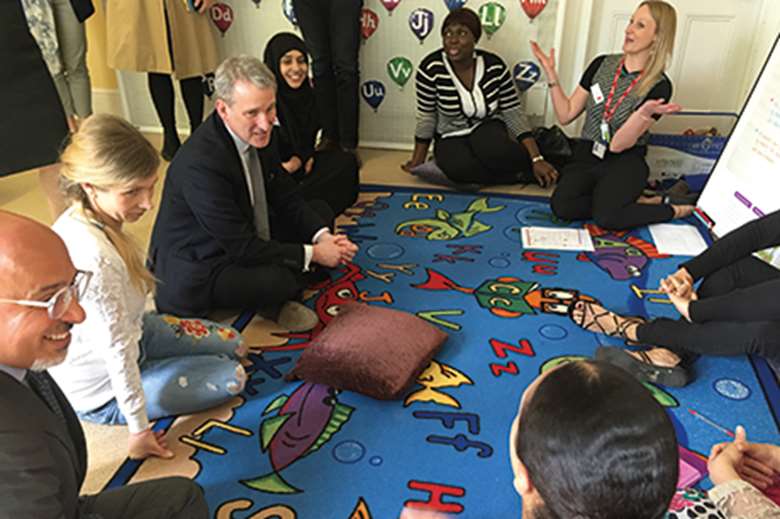Government commits to halving the early years literacy gap
Tuesday, July 31, 2018
The education secretary will today pledge to halve the number of children starting school below the expected level for speaking and reading by 2028.

In his first major speech on social mobility, Damian Hinds will set out a new ambition to halve the number of children starting school without the early speaking or reading skills they need to be ready for school.
With more than a quarter of four- and five-year-olds (28 per cent) below the ‘expected level’ for communication and literacy skills at the end of the Reception, according to the latest EYFS Profile results, Mr Hinds says it is now a ‘key priority to reduce this figure’.
To meet this goal, the education secretary is to form a new coalition of businesses, charities, tech companies and media groups to encourage more parents to read and learn new words with their children.
The coalition, whose founding members include the National Literacy Trust and Public Health England, will hold a summit in the autumn to come up with practical ideas to boost parents’ confidence with supporting their child’s language and literacy from an early age. This could include awareness-raising campaigns, like the ‘5-a-day’ public health campaign that encouraged more people to eat fruit and vegetables, as a model for changing parents’ behaviour.
Today’s announcement builds upon £20 million in funding from the Department for Education (DfE) to narrow the gap between disadvantaged children and their peers and to provide practical tools and advice to parents so they can help their children learn new words. This includes a £5 million trial, run by the Education Endowment Foundation (EEF) in the North of England, £6.5 million for voluntary and community group projects, and £8.5 million for councils to improve early language and literacy for disadvantaged children.
Making the speech today, education secretary Damian Hinds is expected to say, ‘It is a persistent scandal that we have children starting school not able to communicate in full sentences, not able to read simple words.
'This matters because when you’re behind from the start you rarely catch up. Your peers don’t wait, the gap just widens. This has a huge impact on social mobility.
‘And the truth is that the vast majority of these children’s time is at home.
‘I don’t have any interest in lecturing parents here. I know it’s parents who bring up their children, who love them, who invest in them in so many ways, who want the best for their children. But that doesn’t mean extra support and advice can’t be helpful.
‘I particularly want us to be harnessing the power of technology. While there are legitimate worries about screen time, media and modern technology can also help to raise awareness and build parents’ confidence around what they can do to help their child’s early language development.
‘To kick start this, today I am inviting businesses, broadcasters and broad range of other organisations to be part of this coalition and to attend a summit this autumn to explore innovative ways to boost early language development and reading in the home.’
Sector comments
I CAN, the children's communication charity, said the coalition of companies and charities must include experts with experience of supporting children with speech, language and communication needs in the coalition.
Chief executive Bob Reitemeier said, 'We welcome the education secretary’s ambition to halve the number of children starting school without early speaking or reading skills. To help ensure this happens, the introduction of the new coalition of businesses, charities, tech companies and media groups must include experts in early language development and who have experience of supporting children with speech, language and communication needs (SLCN).
'Research shows that in some areas of deprivation 50 per cent of children are starting school well behind their peers in language development. Without support, the gap between these children and other children will continue to widen, year on year, putting their life chances at risk. The evidence from our Bercow: Ten Years On report shows that if the Government does not address this as part of its social mobility strategy they are letting these children down.'
Save the Children, National Day Nurseries Association (NDNA) and the school leaders' union NAHT called on the Government to place more focus on the early years.
Save the Children's director of UK poverty Steven McIntosh said, ‘We warmly welcome this commitment to address the hidden crisis in pre-school learning. One in four children, and almost half of the poorest, fall behind in their learning before they even start school.
‘Parents will always be the biggest influence on a child’s development. It is very welcome to see the Education Secretary take a lead on how society can come together to help mums and dads support their children’s early learning. But 95 per cent of children in England attend formal childcare before school and there are still major gaps in the quality of this early education. We face a critical shortage of skilled early years teachers, who are trained to identify and support children falling behind - yet, this month, the government backtracked on a commitment to tackle it.'
Purnima Tanuku, chief executive of National Day Nurseries Association (NDNA), said, 'The priority should not be on capital infrastructure programmes to develop new provision; the existing provision in the private and third sector already provides highly qualified staff delivering high quality childcare so the priority should be to make the best use of this existing resource.
'The priority for the Government and local authorities should be to work with private and third sector providers to deliver high quality care in existing settings, avoiding any duplication of provision.
'Some local authorities are already struggling to maintain existing provision with budget cuts. Private and third sector nurseries play a key role in delivering the social mobility agenda and supporting families.'
NAHT's general secretary Paul Whiteman said, ‘it is good to see a commitment from the Government to finding practical ideas about how best to boost parents’ confidence in boosting their child’s speech and language development, and NAHT will happily pass on our members’ expertise in this area.
‘However, we would also urge the Government to invest in vital services including speech and language therapy, and early years services for disadvantaged families, so that those children who need specialist support receive it as early as possible. If the Government is serious about improving social mobility, early years is the sensible place to invest additional funding.’
The Pre-school Learning Alliance pointed out that children naturally learn and develop at different rates.
Chief executive Neil Leitch said, 'It’s important to remember that children naturally learn and develop a different rates and so, while it’s of course vital that a child’s educational progress isn’t defined by their family background or income, suggesting that some children not being able to read full sentences at the start of reception – when most children are just four-years-old – is a ‘scandal’ is a vastly overly-simplistic take on what is a complex and nuanced issue.'
Mr Leitch also said that if the Government is committed to 'closing the gap' it needs to confirm how it plans to safeguard the future of children's centres.
'We have always said that parents are their children’s primary educators and so the education secretary is right to highlight the importance of the home learning environment in improving social mobility in the early years. Unfortunately, the government’s actions to date on this simply haven’t matched its rhetoric, and it is incredibly disappointing that a speech about this important issue failed to highlight to the role of one of the most crucial sources of early and family support: children’s centres.
‘While achieving this won't be easy, we know that all parents care about the future of their children. However, it can sometimes be difficult to get them involved in their child’s learning and we know little about how to do this well. The EEF is testing different ways of tackling the early literacy gap. This should give us much needed information about how we can give parents the tools they need to give their child the very best start in life.’
Shadow education secretary Angela Rayner said, 'The measure of our education system should be the support that it offers to the most vulnerable children, and the steps we take to level the playing field between them and their more affluent peers. Quite simply, the Conservatives are failing this test.'







